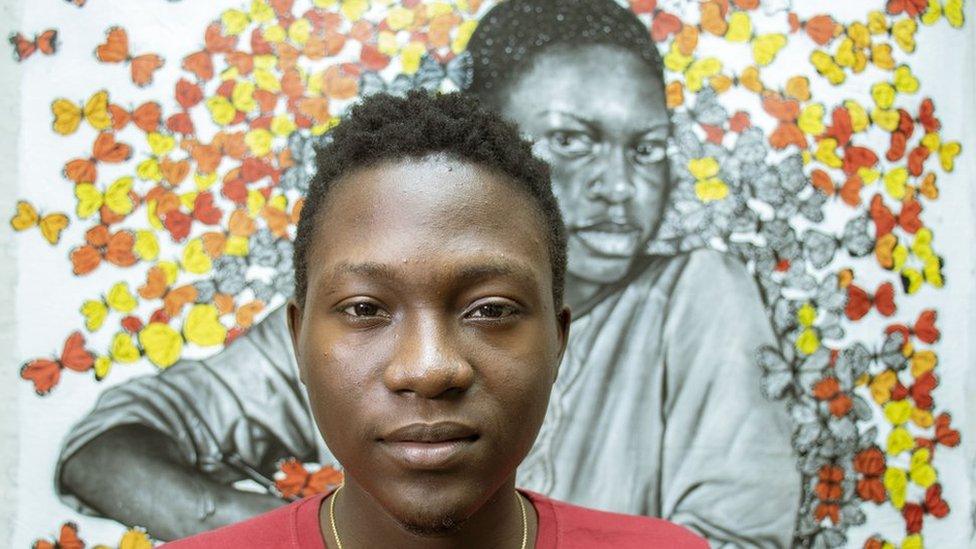Nigeria election 2019: Do the promises stack up?
- Published
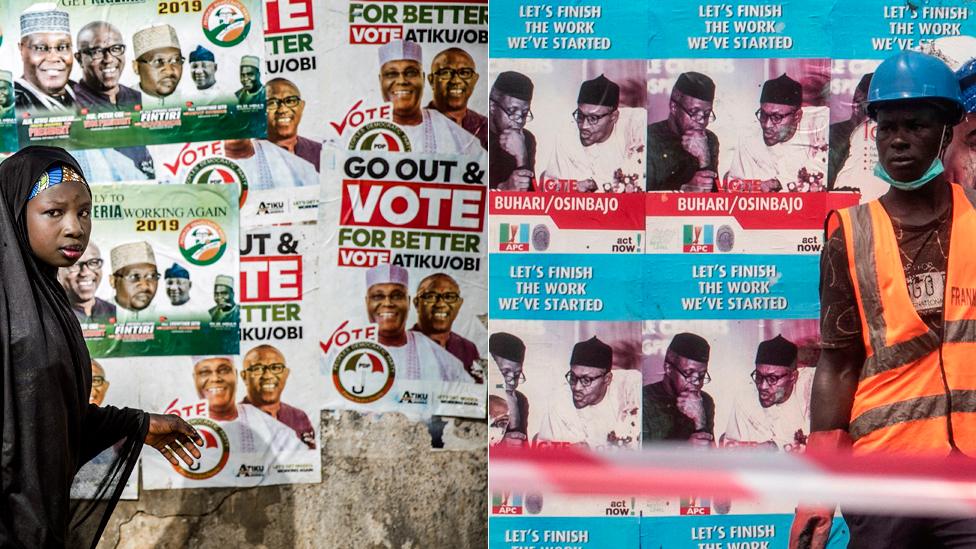
Nigerians have been bombarded with pledges, slogans and social media messages for months ahead of Saturday's presidential election.
A vote for incumbent President Muhammadu Buhari will take Nigeria to the "next level", promises his All Progressives Congress (APC) party. Opting for his main rival, Atiku Abubakar, a former vice-president, will bring "power to the people", according to the slogan of the People's Democratic Party (PDP).
But what about the detail?
We have been looking at some key policy areas - education, health and the economy - and trying to see whether what the candidates have said or promised in the past few months matches up to the truth.
Click through the links below to see what Mr Buhari and Mr Atiku have said and whether it was accurate.
-
Economy
-
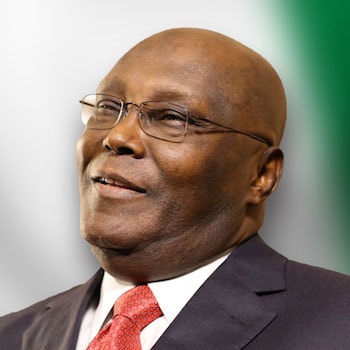 Atiku AbubakarThe most important question in this election is: Are you better off today than you were four years ago? Are we richer or poorer?
Atiku AbubakarThe most important question in this election is: Are you better off today than you were four years ago? Are we richer or poorer?- Date: 9 November 2018
- Source: Twitter post Twitter post
Nigeria remains a country with high levels of poverty and economic inequality. Mr Abubakar seems to be suggesting that those levels have not changed in the past four years, and may even have worsened.
Available data shows that he may be correct.
The overall Nigerian economy, measured in terms of GDP, has been recovering from a recession since a drastic fall in the price of oil in 2016.
Between 2014 and 2017, the average annual income dropped from $3,222 (£2,500) per person in 2014 to $1,968 per person three years later, according to measurements by the World Bank.
Meanwhile, the gap between the richest and poorest Nigerians has been increasing rapidly.
Lagos-based businessman Aliko Dangote is Africa's richest man. Forbes estimates his wealth at $10.5bn.
Nearly half of the population live below the international poverty line of $1.90 per day. Four years ago, 85 million Nigerians were categorised as poor, and this figure has been going up year after year.
Extreme poverty in Nigeria is increasing at a rate of nearly six people every minute or roughly 3.2 million people annually. The World Poverty Clock projects that 120 million Nigerians will be living in poverty by 2030.
The situation is worse in northern Nigeria than in the southern states. Between 2004 and 2013, the total number of poor people in the south declined by almost six million whereas it increased by almost seven million in the north.
-
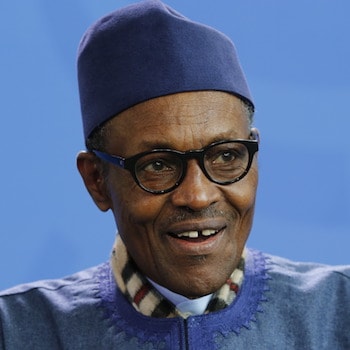 Muhammadu BuhariIn agriculture, we are seeing increased investment across the entire value chain from agricultural inputs to farming and ultimately, food processing. Barely three years ago, Nigeria was spending $5m a day on rice importation. Today rice imports have virtually stopped. Indeed, we are on course to achieve food security in major staple foods in the not too distant future.
Muhammadu BuhariIn agriculture, we are seeing increased investment across the entire value chain from agricultural inputs to farming and ultimately, food processing. Barely three years ago, Nigeria was spending $5m a day on rice importation. Today rice imports have virtually stopped. Indeed, we are on course to achieve food security in major staple foods in the not too distant future.- Date: 19 December 2018
- Source: Budget speech Budget speech
President Buhari is not correct.
The federal government did set a course to invest heavily in agriculture in its Economic Recovery and Growth Plan 2017-2020.
It aimed to make Nigeria totally self-sufficient in rice production by 2018 and wheat production by 2020. However, fulfilling that pledge for rice was not realised by the end of last year, and meeting the same target for wheat looks even more unlikely.
Although production of rice in Nigeria has grown slowly over the past five years and is projected to increase in 2019 as well, the country still remains one of the world's largest rice importers.
In 2014, the average price per metric tonne of rice was $425 (£330). At the time, Nigeria was importing 2.6 million tonnes of rice, which meant that roughly $3m a day was being spent on importing rice.
In 2018, the price per tonne of rice had not changed significantly. Despite a decreased import load - 2.4 million tonnes of rice were imported in 2018 - Nigeria still spent about $2.7m per day.
Nigerians have not yet abandoned their love of jollof rice, a national dish, and the demand for rice has grown along with the population.
-
-
Education
-
 Atiku AbubakarWhen our administration came into being in 1999 the [education] situation was already bad. However, by 2007 when we left, we made it better than we met it. Our administration increased the salaries of teachers and lecturers. We committed a higher sectoral allocation to education than what was the norm before us.
Atiku AbubakarWhen our administration came into being in 1999 the [education] situation was already bad. However, by 2007 when we left, we made it better than we met it. Our administration increased the salaries of teachers and lecturers. We committed a higher sectoral allocation to education than what was the norm before us.- Date: 12 August 2018
- Source: This Day newspaper interview This Day newspaper interview
In 1999, shortly before Olusegun Obasanjo and Atiku Abubakar came to power as president and vice-president respectively, the government allocated 2.7bn naira ($7.5m at the 1999 rate) to education. By the next budget, in the year 2000, education expenditure had risen to 40.9bn naira and by the end of the administration in 2007 the figure was 221bn naira.
However, the rise in spending on education came as overall government spending rose by 3500% over the same period. As a proportion of total government expenditure the amount spent on education increased from nearly 5% to nearly 10% by 2007.
It is therefore true that more money was allocated to education than before Mr Abubakar became vice-president.
How this money was spent, for example whether it was matched by a salary increase, is more difficult to establish.
But was the increase in spending matched by a rise in the proportion of young people attending school?
In 1999, a United Nations survey found that 56.8% of primary school age children were attending school in Nigeria and in 2007 that figure had risen to 64.4%. As the population was rising, this also represents a greater number of children being educated, but the figures suggest that when Mr Abubakar stepped down as vice-president more than a third of Nigerian children were not attending primary school.
-
 Muhammadu BuhariThe APC [will] fully implement and enforce the provisions of the Universal Basic Education Act with emphasis on gender equity in primary and secondary school enrollment whilst improving the quality and substance of our schools; targeting up to 15% of our annual budget for this critical sector whilst making substantial investments in training quality teachers at all levels of the educational system.
Muhammadu BuhariThe APC [will] fully implement and enforce the provisions of the Universal Basic Education Act with emphasis on gender equity in primary and secondary school enrollment whilst improving the quality and substance of our schools; targeting up to 15% of our annual budget for this critical sector whilst making substantial investments in training quality teachers at all levels of the educational system.- Source: APC manifesto APC manifesto
Nigeria's Universal Basic Education Act, passed in 1999, said the government should provide six years of free primary school education. Students are expected to attend an additional three years of junior secondary school, which are not paid for by the state.
There is no mention that boys and girls should be educated in equal number, but currently across Nigeria more boys go to school than girls - for every nine girls at school there are 10 boys.
Special emphasis is often given to increasing female enrolment.
The UN's education organisation Unesco defines acceptable gender parity as between 98 and 102 females to every 100 males enrolled in school.
According to the 2016 National Education Indicators, fewer than one in three states have acceptable gender parity ratios at the primary level. At the junior secondary level, this falls to nine states and at the senior secondary level this drops even further to three states.
Ekiti state performs the best, having achieved gender parity at all levels of education.
Katsina state has the greatest disparity at all levels in terms of number of students. Over 170,000 more boys are enrolled than girls in primary education; over 43,000 more boys than girls in junior secondary and nearly 44,500 more boys than girls in senior secondary.
However, when expressed as a percentage of the total population of enrolled students, Zamfara state comes off worst. At all levels of education, twice as many male students are enrolled as female students. The quality of the education these students receive is also a matter of consideration. According to the 2015 Nigerian Education Data Survey (Neds), 44% of students in government-funded primary schools could read and 74% of students in private primary schools. At the junior level, these figures increased to 91% and 96%, respectively.
President Buhari has vowed to commit 15% of the national budget to education. Yet his record in office suggests that much more work needs to be done to reach that figure.
In 2016, his administration allocated 8% of the budget to education and in 2017 this amount fell to 7.4%. The figure now stands at 7% of the national budget, just more than 650bn naira ($1.8bn, £1.4bn). To reach the targeted 15% of the national budget, the president would need to more than double the current funding package to 1.3tn naira, or reduce expenditure elsewhere.
-
-
Health
-
 Atiku AbubakarAbout 57 million Nigerians have no access to clean drinking water and at least 130 million Nigerians live in environments that are dirty with no proper sanitation facilities.
Atiku AbubakarAbout 57 million Nigerians have no access to clean drinking water and at least 130 million Nigerians live in environments that are dirty with no proper sanitation facilities.- Source: PDP presidential Manifesto
Atiku Abubakar is correct. In 2015, the World Health Organization (WHO) revealed that 57 million Nigerians did not have access to clean drinking water and 130 million had no access to sanitation facilities.
That meant almost three-quarters of Nigerians did not have a proper toilet.
Diarrhoeal diseases, which can easily be prevented through access to safe drinking water and by using clean toilets, are among the biggest killers of children in Nigeria.
In 2017 the WHO estimated more than 74,000 children below the age of five had died from diarrhoeal diseases.
Urban areas generally have a high population density, which forces as many as one in three Nigerians to use shared toilets and that increases the risk of contamination.
But things are worse in rural areas.
In 2016, less than six out of every 10 people in the countryside had access to clean drinking water and less than a third had proper sanitation.
In November 2018, President Muhammadu Buhari declared a state of emergency over sanitation and clean water.
-
 Muhammadu BuhariAccess to piped water services which was 32% in 1990 declined to 7% in 2015 [the year I came to power]; access to improved sanitation also decreased from 38% in 1990 to 29% in 2015. Our country now ranks No 2 in the global rating on open defecation as about 25% of our population are practicing open defecation.
Muhammadu BuhariAccess to piped water services which was 32% in 1990 declined to 7% in 2015 [the year I came to power]; access to improved sanitation also decreased from 38% in 1990 to 29% in 2015. Our country now ranks No 2 in the global rating on open defecation as about 25% of our population are practicing open defecation.- Date: 8 November 2018
- Source: Speech at State House Speech at State House
This is partly true. President Buhari is correct that Nigeria has the world's second-largest number of people who practise open defecation, which means they do not use any kind of toilet facility. Only India has more.
More than 46 million Nigerians practise open defecation, according to the World Bank's World Development Indicators database. This is roughly a quarter of the population.
But there are wide regional variations.
Today the prevalence of open defecation is about twice as high in rural areas than urban, but the impact of not using toilets could be much greater in more densely populated areas, giving major cities like Lagos cause for concern.
In 1990, the WHO estimated that 38% of people had access to sanitation facilities, but only 25% in 2015.
Today, Nigerians in most states do have access to improved sources of drinking water, but by and large it is not piped water directly into the home or property, which is considered the highest level of service.
In all of Nigeria, it is only in and around the capital, Abuja, that more than one in 10 people have water piped into their homes.
One in three Nigerians rely on wells or boreholes for their drinking water, which is also an improved source of clean water.
In the north, two in five homes still have no easily accessible source of clean water.
-

More about Nigeria's vote:

Main presidential candidates
- Born in 1942 to a Muslim family in northern Katsina state
- Former soldier, led military regime in 1980s, remembered for strictness
- Tardy civil servants had to perform frog jumps in public
- Won 2015 presidential election, the first opposition candidate to defeat an incumbent, with promise to beat corruption and Boko Haram insurgents
- Told wife she belonged in kitchen after she complained in a BBC interview about his government
- After long absence from illness, had to deny rumours that he had been replaced in public by a lookalike
- Read full profile
- Born in 1946 in northern state of Adamawa
- Co-owner of multinational oil services company that started life in a Lagos shipping container
- Oversaw privatisations during two terms as vice-president.
- Fought against corruption charges, describing them as politically motivated
- Founded American University which gave scholarships to some of the “Chibok girls” that survived Boko Haram kidnapping
- His father, a devout Muslim, was briefly jailed for trying to stop him from attending a Western-style school
- Read full profile
- Published27 February 2019
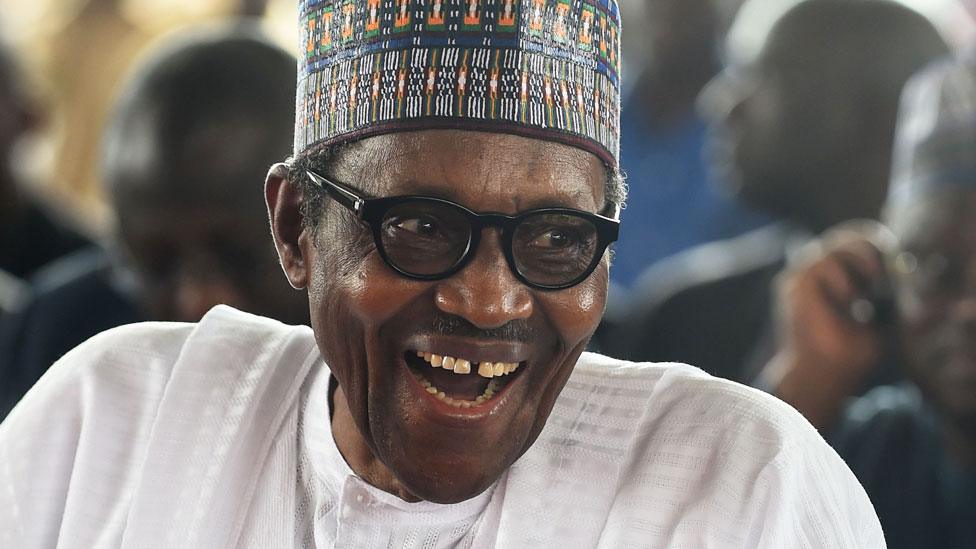
- Published23 February 2023
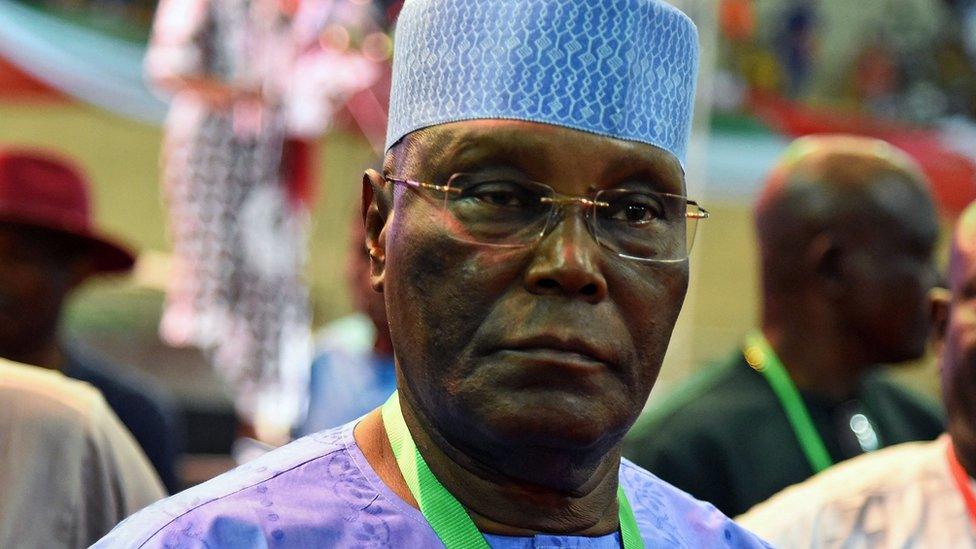
- Published4 February 2019
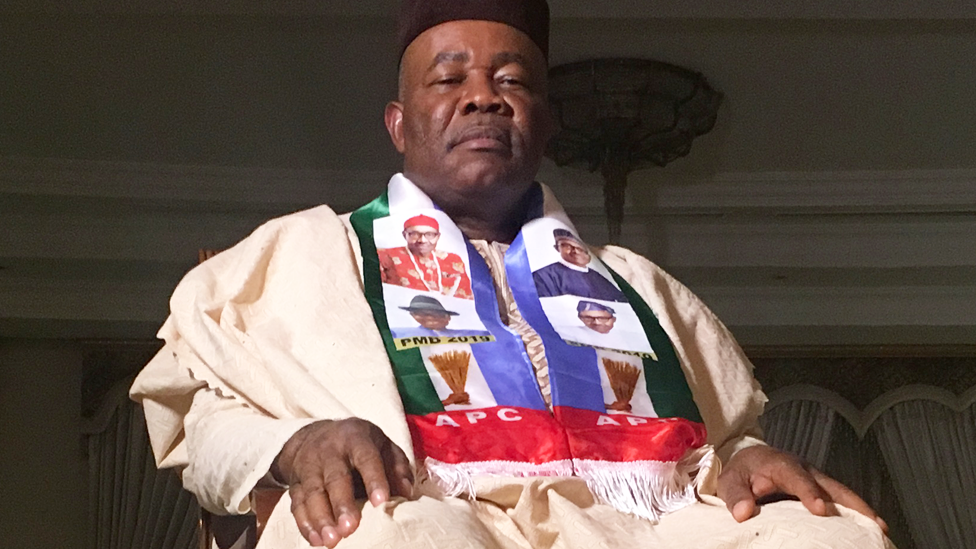
- Published14 February 2019
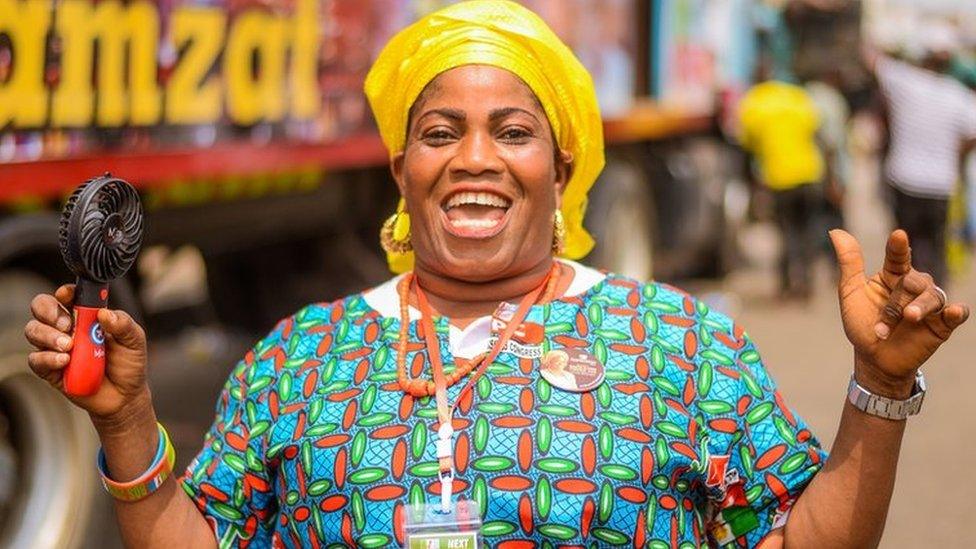
- Published10 February 2019
